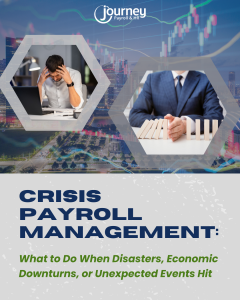Storms, outages, cyber incidents, strikes, sudden revenue shocks, crises never show up with a calendar invite. Yet payroll has to land on time, every time. When people are worried about the future, the one thing they shouldn’t have to worry about is their paycheck.
 That’s why your payroll plan needs to be built for “bad timing.” The goal: to prepare, respond, and recover without losing compliance or your team’s trust.
That’s why your payroll plan needs to be built for “bad timing.” The goal: to prepare, respond, and recover without losing compliance or your team’s trust.
Prepare Before You Need It
The best crisis payroll management starts long before the first storm cloud rolls in. Think of it as your continuity playbook, a guide that keeps operations moving no matter what.
Document every step of your payroll process, from approvals to backups, and make sure offline copies exist. Train at least two people to process payroll with multi-factor authentication and have emergency admin access ready to go. Backup IPs and devices should be whitelisted, so access doesn’t grind to a halt when the unexpected hits.
Banking continuity matters, too. Set up secondary funding methods like alternate ACH or wire capabilities, along with pre-approved thresholds for emergency transactions. Automate your daily exports of time and payroll data to a secure vault and keep a vendor hotline list for after-hours support, from payroll software and benefits providers to your bank.
When the Crisis Hits
The first few days of a crisis are all about triage. Lock in your current pay cycle and gather time data through whatever fallback channels work text, CSV uploads, even printed reports from kiosks.
If your systems are down, take the fastest clean path. Run a simplified payroll with base salaries and standard hours and plan to true-up on the next cycle. Communicate early and clearly with your team, let them know if pay methods or timing will change, and when corrections will happen.
Don’t forget compliance. Even in a crisis, wage statement content, layoff pay timing and notice requirements still apply. Keep documentation of any exceptions to stay audit-ready.
Weathering Economic Downturns
Not every crisis is a natural disaster. Sometimes it’s financial. During downturns or cash flow shocks, predefined scenarios make tough decisions easier.
Map out in advance which levers to pull first, hiring freezes, reduced overtime, deferred bonuses, or compressed schedules and make sure leadership aligns on the order. Any pay reductions should be legally sound, equitable, and time-bound.
Review benefit contributions carefully to avoid unintended COBRA triggers and communicate early about Employee Assistance Programs or resources that can help staff weather the storm alongside you.
Cyber or Vendor Outages
If a cyber incident or vendor outage hits, containment is your first move. Rotate credentials, revoke tokens, and shift processing to secure backup devices or domains.
When you can’t access your full system, fall back to manual runs: standard salaries for exempt employees, and prior-period averages for hourly staff. Track every variance so you can reconcile later.
Once systems are restored, re-import true time data, correct taxes, gross-up where needed, and issue off-cycle adjustments. Precision in recovery ensures compliance and restores confidence.
After the Crisis: Audit, Learn, Improve
When the dust settles, the recovery phase begins. Compare your crisis payroll to what should have run and log any variances by employee. Conduct a root-cause review: what worked, what failed, and what needs changing.
Turn those lessons into new policies, and make crisis drills part of your regular rhythm quarterly tabletop exercises to keep your team sharp and confident.
Communicating Through the Chaos
During disruptions, communication is your best stabilizer. Keep messages short, calm, and transparent.
For example:
- “We’re running payroll on schedule using a simplified process due to [event]. Any differences will be corrected on [date].”
- “Please submit total hours by [time] using this form or text. Managers will confirm before 5 p.m.”
- “We’ve posted an adjustment of $X for pay period [date]; taxes and benefits have been reconciled.”
Clear, consistent updates show employees that you have a plan and that their pay is still your priority.
Building a Crisis-Proof Payroll Plan
At Journey Payroll & HR, we help businesses create payroll systems that perform under pressure. From continuity playbooks and off-cycle processing to backup funding and secondary operator training, we make sure pay always lands no matter what the world throws at you.
Because when crisis hits, the last thing your team should worry about is payday.